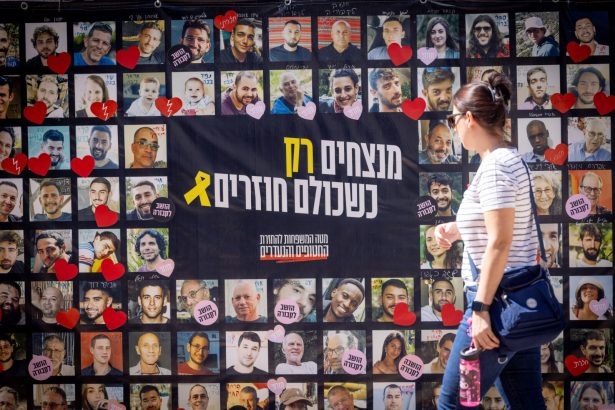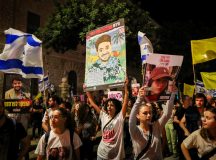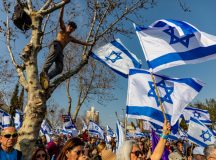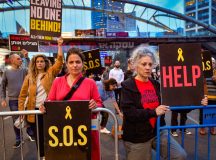Tuesday 7 October – Evening
As three stars became visible in the cloudless Tel Aviv sky, signaling the end of the first day of the Sukkot holiday, the heaviness of the 7 October anniversary suddenly struck me. Soon afterwards, I began watching the Families’ Memorial Service in HaYarkon Park in Tel Aviv. The memorial was organised by Kumu (Rise!), a movement founded by families of victims, hostages, and survivors of the Hamas attack. Following performances by artists and testimonies from survivors and bereaved families, Kumu founder Yonatan Shimriz took the microphone. Yonatan’s brother Alon was a hostage in Gaza before being tragically killed by IDF troops along with Yotam Ḥaim and Samer Talalka in December 2023. Yonatan relayed how two years earlier, as they celebrated his daughter Yahli’s second birthday in the Mamad safe room along with his pregnant wife, and learned that terrorists had entered Alon’s house, he had vowed that Israelis as a people would rise again. He added that when he finally learned of his brother’s death, he couldn’t find meaning in life. Yet three weeks later, when his son Lavi was born, he again vowed, this time to the newborn and to Yahli, that we as a people would rise again.
The only thing that functioned in the State of Israel that dark day was the people, Yonatan explained. It was the people that came to places where the government was not. And then, to thunderous applause from the crowd, he spoke to the hostages. ‘When you return, and the war ends,’ he began, ‘our generation will take off its military uniform, shake off the dust from the burned houses, and wash off the omissions that the previous generations left us. Our generation that inherited a state bloodied, isolated, polarised and in pain, will be the one that will fix.’
I thought back to the families’ memorial event the year before, and how Israeli singer Rita sat on a chair with a yellow bicycle in front of an image of a charred building. She had told of how one day, new buildings would rise alongside the destroyed Sderot police station, and old slides in the kindergartens of the Gaza envelope would be re-painted. On that day, she added, when we have brought everyone home, we will feel that long awaited warm embrace. One day it will happen.
And then she began singing one of her famous songs:
One day it will happen, it will come / like a line carved in a palm it will come / sure of itself / as though it’s always been there / waiting for us to notice it / the clenched hands will stretch out / and the heart keeping itself from getting hurt will beat at a regular pace / it will come like nature is used to being at peace with itself / one day it will happen without us noticing / something will change / something will touch us / something will calm in us and there’ll be nothing to fear/ … you already know not everything will shake us / not everything will hit / and that which shall open for us is waiting.
I wondered whether, after two years of hurt and trauma, we can indeed reach such a state. And whether, in addition to the Sderot police station being rebuilt and people returning to their homes in the south, we could really bring everyone home.
Thursday 9 October
I woke up to heavy rain – the first of the season – and the incredible news that a ceasefire deal had been achieved, including the release of all the hostages. The release formed part of a 20-point plan by President Trump which is meant to see the disarmament of Hamas, the deployment of a temporary International Stabilisation Force to Gaza, and the ultimate return to the Strip of a reformed Palestinian Authority.
Some believe the agreement is due primarily to Trump’s pressure on Netanyahu, while others explain it as a result of consistent military pressure on Hamas by the Netanyahu government. To me, it seems most likely a consequence of Qatari, Turkish and Egyptian pressure towards Hamas for which they received benefits – the Turks F-35 stealth fighters; the Qataris a defence pact; and for Egypt, no displaced Gazans flooding Sinai and greater influence in Gaza.
Israelis, meanwhile, are debating whether this deal could (more or less) have been achieved a year ago, or whether it represents something new – primarily because the IDF will stay in Gaza after all the hostages have been freed. Much of this is tinged by politics, as is the battle over the credit.
The Netanyahu government seeks to claim a strategic victory – not only the collapse of the Axis of Resistance (Iran, Hezbollah, Assad), but a return of all the hostages (a feat few actually believed possible); all while the IDF remains in the Gaza perimeter. Yet Israel is diplomatically isolated, forced to free 250 terrorists serving life sentences (alongside another 1700 prisoners in Israeli jails), and the Palestinian Authority will have a foothold in Gaza – something Netanyahu has consistently opposed for two years. It may be the best that could have been achieved. But let no one doubt that if Netanyahu was in the opposition rather than prime minister’s seat, he would excoriate the government over a ‘surrender deal.’
The long-promised ‘Total Victory’ it certainly is not.
But after 7 October, no victory is total, no happiness whole.
Former colleagues from a think tank I used to work in are debating the deal on Whatsapp. Yotam HaCohen argues this is far from the end of the story. Hamas, which is an acronym for the Islamic Resistance Movement, is ‘not about to give up one part of its name.’ He worries that Israeli society lacks the stamina for a long struggle. ‘In Israel we are excellent short distance runners,’ he notes, ‘but we’ll fall asleep again, and believe them when they say they have changed. Our enemy is running a race for eternity, passing the baton from one generation to the next, and is already describing October 7 as a heavenly miracle.’
Another colleague and friend, Omri – a father of two in his late 40s who spent hundreds of days in reserve duty – agrees that Israelis need to prepare for a marathon. But sometimes, he adds, one needs to pause and rest a little. He relates how earlier that morning in his reserve duty, a different feeling was in the air. None of them had slept. ‘Towards 3am,’ he tells me later, ‘orders began arriving to pull back the forces. At 4am, the yellow line the troops needed to withdraw to was drawn on the map.’ For him that was symbolic – when ‘you see the line on the map and begin to talk about moving backwards rather than advancing.’ As that was happening, the heavens suddenly opened ‘and it started pouring with a blessed dose of rain,’ he said.
Saturday 11 October
Along with tens of thousands of Israelis, I am standing in Hostages Square in Tel Aviv. The atmosphere is festive and joyous, as I try and find a spot providing a clear view of the giant screen amongst the throngs . A verse in Psalms – that also forms part of the Grace after Meals our family had sung earlier in the day after our Shabbat meal in the Sukka – says that those who sowed with tears will ultimately reap with joy. After all the tears had been shed in this square, many had also felt the need to be there tonight. One young girl with sandals and mosquito-bitten legs holds a red and pink sign with the words, ‘we are waiting for you at home.’ During the speeches of Steve Witkoff, Jared Kushner, and Ivanka Trump, chants ring out of ‘Thank you Trump,’ while a man behinds me adds that ‘nothing would have happened without him.’ Most media outlets focused on the loud booing when Netanyahu’s name was mentioned, although fewer mentioned the loud applause when Kushner referred to the deal also ending the suffering of the many innocent Gazans. After speeches by parents of hostages, Yuval Raphael, a survivor of Nova and Israel’s representative at Eurovision 2025, performed her song New Day will Rise. ‘A new day will rise, life will go on,’ she sang. ‘Everyone cries, don’t cry alone, darkness will fade, all the pain will go by, but we will stay.’
For the first time in a long, long time, there is a feeling that darkness is fading, that part of the weight on us is lifting, that we can begin to breathe.
Sunday 12 October
I have been thinking about the colourful sign next to that huge red clock in Hostages Square – which yesterday showed 735 days – with the headline ‘Only the people can return everyone’ (in Hebrew it rhymes).
I remember one night a few weeks ago when the protests were intensifying. Israelis were marking 700 days since 7 October, and the government was pushing for an operation in Gaza City against the recommendation of the IDF chief of staff, who said he could not guarantee the safety of the remaining hostages. While my wife and I tried to put the children to sleep, our songs about angels and peacefulness were drowned out by the chanting and megaphones outside – a cacophony of staccato drums, shouts and sometimes howls from an increasingly desperate crowd.
May the angel who redeemed me from all evil, bless the lads; and let my name be named in them, we sang.
EVERYONE! NOW! EVERYONE NOW! I heard from the street.
On my right is [the archangel] Michael, and on my left is Gabriel, we continued.
BRING EVERYONE HOME
Before me is Uriel, behind me is Raphael,
WHY ARE THEY STILL IN GA-ZA?!
And above me is the Presence of God.
WE ARE WITH YOU. YOU ARE NOT ALONE
May there be well-being within your ramparts, peace in your citadels.
WE WON’T ABANDON THEM
For the sake of my kin and friends, I pray for your well-being;
THERE IS NO VICTORY UNTIL THE LAST HOSTAGE
Sometimes, despite our attempts to create a bubble – especially for our 8 and 5-year olds – the outside world bursts in.
In retrospect, it indeed seems clear that the demonstrators played a crucial role in convincing Trump to push for a ceasefire. Feeling disillusioned with and abandoned by the Netanyahu government – many of whose ministers had sought to delegitimise their protests – the demonstrators began directing their appeals towards Trump. Work was done behind the scenes, primarily by the families and aided by the parliamentary opposition, to ensure the president saw the images. In late September, he shared a photo of the protests in Hostages Square.
Whatever one thinks of Trump – and strong evidence suggests he is a corrupt, narcissistic, wanna-be autocrat trying actively to hollow out American institutions, enrich himself, and weaken the trans-Atlantic alliance that has brought security to Europe since World War Two – this deal would have been impossible without him. A resolution to a three thousand-year old conflict it is patently not. Nor is he like Cyrus, the Persian Emperor, as some roadside signs in Israel declare.
And yet…
And yet no one else could have successfully pressured, frightened, and bribed the main players in this conflict the way that Trump did. Israelis have huge amounts of gratitude towards him.
Monday 13 October
It’s quiet in my neighbourhood in Jerusalem as I walk towards the hostage tent a few hundred metres away. At the corner is the pizza store with bubble graffiti saying ‘Hersh Forever’ in memory of Hersh Goldberg Polin. Dozens watch TV on a large screen at the tent as the remaining 20 live hostages are transferred from Hamas control to the Red Cross and then on to Israel, where in emotional scenes they reunite with their families. The names of all of them – both alive and dead – have been written in chalk along the street. It is incredible that this day has come.
That evening, as Simḥat Torah, the last day of Sukkot, arrives, we take the children to dance there, at the place that has seen so much sadness.
As we move round in circles in the car-less street, I think of Hersh’s mother Rachel, who spoke in Jerusalem on Saturday night. How she discussed the book of Ecclesiastes, which Jews read on the Shabbat during Sukkot and which describes a time and season for everything: To love and to hate; to be born and to die; to kill and to heal; to break down and to build up; to weep and to laugh; to mourn and to dance. Speaking to the crowd, Rachel said that these days,
We are being asked to digest all of those seasons at that same second. It says there is a time to weep and a time to laugh and we have to do both right now; a time to hug and a time to hold back from hugging and we have to do both right now; a time to tear and a time to heal, and we have to do both right now; a time to be silent and a time to speak and we have to do both right now; a time to sob [and here she paused to sob deeply] and a time to dance and we have to do both right now.
In “A Man Doesn’t Have Time in His Life,” Yehuda Amiḥai wrote that Ecclesiastes was wrong. A man doesn’t have time in his life to have time for everything, doesn’t have seasons enough for every purpose.
A man needs to love and to hate at the same moment, / to laugh and cry with the same eyes, / with the same hands to throw stones and to gather them, / to make love in war and war in love. / And to hate and forgive and remember and forget, / to arrange and confuse, to eat and to digest / what history / takes years and years to do.
I also think of Iris Ḥaim, the mother of Yotam, who was killed by the IDF alongside Yonatan Shimriz’s brother, Alon. As news came of the ceasefire she wrote that while she was grateful, there was no joy in her heart. As I put my children on my shoulders to dance with the Torah, I tried to integrate Iris’ suggestion that we ‘rejoice modestly, rejoice quietly, rejoice with a trembling voice.’ I remembered her caution that
Yes, it is right to rejoice… but to remember at every moment those who did not get to hug again. Those who starved and did not return, those who wanted and did not receive the laughter of their golden-haired child.
As we chant the song An Eternal People is not Afraid of a Long Path, I do not forget that while families are rejoicing, others are marking the anniversary of their loved ones’ murder. That while the people celebrate the return of 20 live hostages, friends and loved ones were burying Roey Shalev, who died by suicide, unable to continue with life after his girlfriend Mapal Adam was murdered alondside him at Nova.
I try to envision how we can hold all these feelings together – the joy, the sadness, the trauma, the relief, the hope. I never imagined being able to laugh and cry with the same eyes, as Amiḥai suggested. But that night, on the streets of Jerusalem, it came naturally.
The struggle of two peoples over control of this small area between the river and the sea continues. It is indeed a marathon and not a sprint.
But the brutal war which began on 7 October seems to be over, and for that we should be grateful.
Our hearts are slowly beginning to beat at a regular pace. We can breathe easier. As Yuval Raphael sang, a new day has risen. The question now for this bruised people is whether we as a country can rise once again.




































